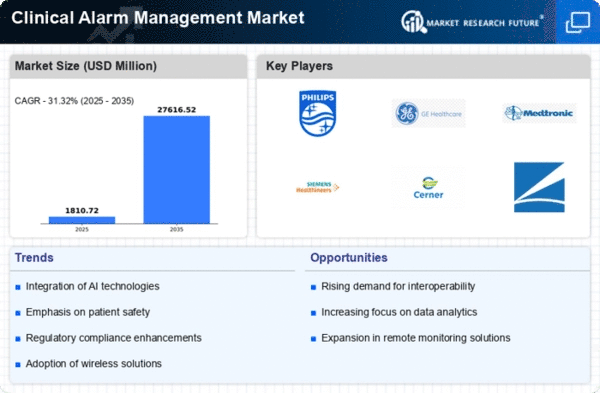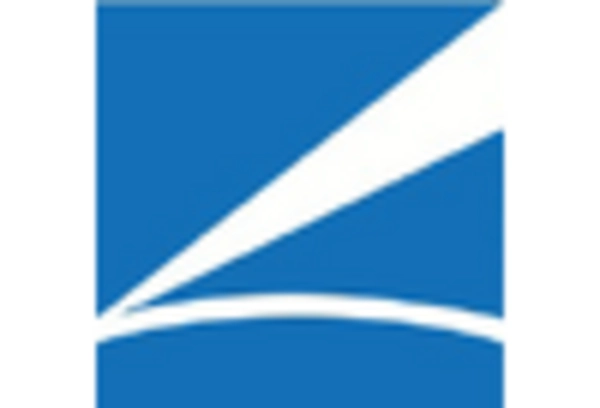Market Trends
Key Emerging Trends in the Clinical Alarm Management Market
The clinical alarm management market is experiencing significant growth and transformation driven by factors such as increasing patient acuity, alarm fatigue concerns, regulatory requirements, and technological advancements in healthcare IT systems. One significant trend in the clinical alarm management market is the adoption of advanced alarm management solutions and strategies to address the challenges associated with alarm fatigue and alarm overload in healthcare settings. With the proliferation of medical devices and monitoring systems generating a high volume of alarms, healthcare providers are implementing alarm management technologies such as alarm middleware platforms, intelligent alarm algorithms, and real-time analytics tools to prioritize and contextualize alarms, reduce unnecessary alerts, and improve alarm response and clinical decision-making.
Moreover, there is a growing emphasis on interoperability and integration of alarm management solutions with electronic health record (EHR) systems, clinical workflows, and communication platforms to enhance care coordination and patient safety. Healthcare organizations are leveraging health information exchange (HIE) standards, application programming interfaces (APIs), and middleware solutions to integrate alarm data from diverse sources into a centralized alarm management platform, enabling real-time monitoring, notification, and escalation of critical alarms to appropriate caregivers. This trend towards interoperable alarm management systems is driving innovation in healthcare IT interoperability standards and interoperability frameworks to facilitate seamless data exchange and communication across disparate systems and devices.
Additionally, the clinical alarm management market is witnessing increasing adoption of remote alarm monitoring and telehealth solutions to extend the reach of clinical alarm management beyond traditional healthcare settings. With the growing prevalence of remote patient monitoring (RPM) and telemedicine services, healthcare providers are leveraging remote alarm monitoring platforms, wearable devices, and mobile health applications to monitor patients' vital signs and physiological parameters remotely, detect early warning signs of deterioration, and intervene proactively to prevent adverse events. This trend towards remote alarm monitoring is driving innovation in telehealth technology platforms, remote patient monitoring devices, and telecommunication infrastructure to support real-time data transmission and communication between patients and healthcare providers.
Furthermore, there is a growing focus on patient-centric alarm management strategies and patient engagement initiatives to involve patients and their families in the alarm management process and empower them to participate in their care. Healthcare organizations are implementing patient education programs, shared decision-making tools, and interactive communication channels to educate patients about the significance of alarms, encourage them to report false alarms or alarms indicating clinical deterioration, and collaborate with healthcare providers to prioritize and respond to alarms based on patients' preferences and clinical needs. This trend towards patient-centered alarm management is driving innovation in patient engagement technologies, patient portals, and health literacy resources to promote active participation and shared decision-making in alarm management activities.
Moreover, the clinical alarm management market is witnessing increasing regulatory scrutiny and compliance requirements related to alarm management practices and patient safety standards. Regulatory agencies such as the Joint Commission and the Food and Drug Administration (FDA) have issued guidelines and recommendations for healthcare organizations to improve alarm management practices, reduce alarm fatigue, and enhance patient safety. This trend towards regulatory compliance is driving investments in alarm management solutions, staff training, and quality improvement initiatives to ensure compliance with regulatory requirements and accreditation standards, and mitigate the risk of adverse events associated with alarm-related errors.
Lastly, the clinical alarm management market is experiencing significant growth in emerging markets, driven by increasing investments in healthcare infrastructure, rising demand for patient safety solutions, and expanding adoption of healthcare IT systems in developing countries. Developing countries in Asia, Latin America, and Africa are witnessing rapid economic growth and urbanization, leading to a growing need for advanced healthcare technologies and solutions to address healthcare challenges and improve patient outcomes. This has created opportunities for alarm management solution providers to expand their presence in these markets by offering affordable, scalable, and customized alarm management solutions tailored to the needs and requirements of local healthcare systems and patient populations.


















Leave a Comment